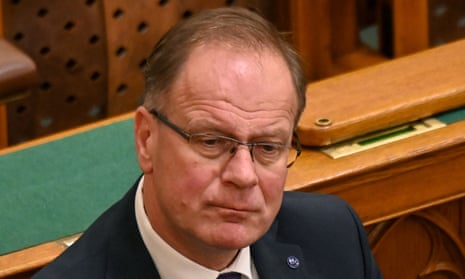Hungary hopes to strike a deal with Brussels on blocked EU funds by the end of the year, as it races against the clock to unlock billions that have been frozen over concerns about state-captured institutions and corruption.
If Budapest fails to reach an agreement with the European commission by the end of 2022, it stands to lose €4.64bn (£3.91bn) in Covid recovery funds, while questions remain over a potential €24.3bn six-year funding programme to upgrade its national infrastructure.
While Hungary’s prime minister, Viktor Orbán, has previously suggested he did not need the EU’s Covid recovery grants, he has sent top officials to Brussels on a charm offensive to unlock the funds.
Hungary’s chief negotiator, Tibor Navracsics, told the Guardian he was optimistic about an agreement on the Covid recovery plan worth a potential €15bn by the end of the year. He also hopes Hungary can strike a “partnership agreement” in early autumn to secure €24.3bn of “cohesion funds”, mostly from the EU.
Both agreements are tangled up with an unprecedented disciplinary process launched against Hungary in April that could lead to the suspension of EU funds because of violations of the rule of law. “[Resolving] the rule of law conditionality procedure might be a pre-condition for having an agreement on the cohesion money, or the RRF [Covid recovery] money,” Navracsics said. The Hungarian government has been given a 22 August deadline to respond to a lengthy letter from the commission warning of “remedial measures”, if Budapest fails to address longstanding concerns about the rule of law.
Hungary has received billions of EU funds since it joined the bloc in 2004, but concerns have spiralled about alleged misuse of EU cash to enrich Orbán’s friends and family. During Orbán’s 12 years in power, independent media has withered and checks and balances have weakened.
Navracsics – a Hungarian former EU commissioner, who was appointed minister for regional development in May – has been sent to Brussels to persuade officials to unfreeze the funds. His low-key charm offensive has been overshadowed by Orbán’s attacks on EU sanctions policy and inflammatory speeches, including an address on so-called race mixing that prompted a leading adviser to quit denouncing “pure Nazi” rhetoric.
Senior EU officials believe Orbán needs EU money, as he grapples with soaring inflation, a plunge in the Hungarian forint and the threat of severe recession. The darkening economic outlook has forced the Hungarian prime minister to scrap energy price caps and hike small business taxes, leading to days of protests in Budapest last month, where people chanted “Orbán get lost”.
Analysts have cited the lack of agreement with the EU as one of the sources of economic pressure on the fragile Hungarian economy.
EU officials sense a moment of leverage to push the government to reform its institutions. But they also mistrust Orbán, renowned for his so-called “peacock dance”, ie, offering cosmetic concessions or a minor tactical withdrawal, while continuing to make Hungary an illiberal state. “Our experience has been over a decade that they say they abide, then drop one thing and then they come back through the backdoor. We have never resolved an issue 100%,” one senior EU official told the Guardian. “That is the big issue of trust.”
The commission would like to create a new authority to safeguard EU funds in Hungary and is calling for stronger anti-corruption bodies and space for NGOs to scrutinise government policy.
The Covid recovery plan is worth €5.8bn in grants to Hungary – €1.4bn less than if it had been approved last year. But 70% of the grants (€4.64bn) will vanish if there is no deal by the end of the year. The total plan could be worth €15bn, if Budapest opts to take up cheap loans on offer.
Navracsics, a member of Orbán’s dominant Fidesz party, would not confirm whether Hungary was prepared to agree to an additional authority to safeguard EU funds. He said Hungary was making “institutional changes”, including changing public procurement rules – a key concern as Orbán’s allies scooped up unusually profitable EU-funded contracts through uncompetitive processes.
Navracsics insisted Hungary could be trusted to make meaningful changes because “we make enough institutional changes [and] because I’m the chief negotiator and I can give personal safeguards for that”.
While he went on to claim Hungary had good record on “absorption capacity” – that is effective spending of EU funds – his answer is unlikely to convince sceptics in the commission or European parliament.
Daniel Freund, a Green MEP focused on EU budget control, said he feared the EU was going to fall into another trap. “ [Orbán] has been outsmarting the commission time and again, signalling he will concede on this or that, and in the meantime preparing his next trick on how to circumvent certain things.”
The German MEP argued Hungary’s plan should not be approved this autumn, because more time was needed to restore the rule of law after 12 straight years of Orbán government. “I think it is unrealistic to have rule of law repaired to a degree where it is sensible to unfreeze the recovery plan in the next two to three months,” he said.
